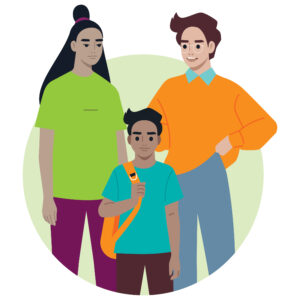Canada is also home to people from many different countries and cultures. They started coming here more than 500 years ago.
In Canada, no group of people is supposed to be better than another. This idea helps to keep the peace between people who live here.
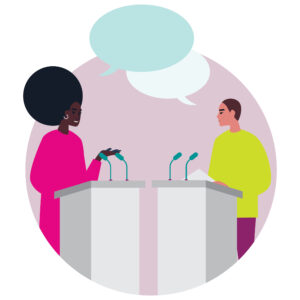
Every individual in Canada has equal rights. Even children have rights. Parents, teachers and other adults cannot hit or neglect children. If a person knows a child is being very hurt, they must report it to a child protection agency.
Every individual has basic freedoms. Everyone can feel, think and believe what they want.
People in Canada disagree about many things. It’s okay not to agree. But there are some rules. One person’s religious or social beliefs cannot harm other people. When everyone shows respect and kindness, everyone feels safe and protected.
Did you know…?
For hundreds of years, Indigenous Peoples suffered from racism and abuse from Europeans who colonized the land. Many Indigenous Peoples lost their lands, languages and lives.
Canada is actively working toward reconciliation. This includes honouring and respecting Indigenous Peoples and practices. We often start meetings at school, work, and in the community with a land acknowledgement. This means using the traditional name of the land where we are meeting. Sometimes an Indigenous person may welcome an audience with words in their language, or a song or prayer.
Even though we have laws, some people still feel and act like it’s okay to harm people who seem different.
If someone is harming you or your family, you can talk to: a settlement worker, a doctor or nurse, a teacher, or the police.
If you are a victim of family or sexual violence, including emotional abuse, you can contact a place called Victim Services:
- Call 1-800-563-0808 anytime day or night
- Available in many languages
- Or text a message to 604-836-6381 (e.g., I need help. A family member hit and threatened me.)
- Victimlinkbc.ca
If it is an emergency, call 9-1-1. You don’t need to know English. There are interpreters in 173 languages. Just say the name of the language you need in English (e.g., “Arabic” or “Tagalog.”)
In Canada, some groups report suffering more harm and hate than others. Terms you might hear:
- “2SLGBTQ+”: 2-spirited, lesbian, gay, bi-sexual, trans-sexual, queer, and other sexual orientations
- “BIPOC”: Black, Indigenous, People of Colour
Health
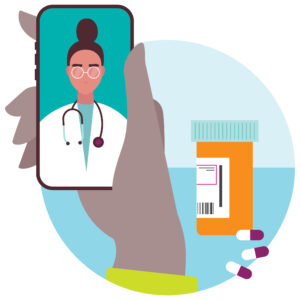
Taking care of our mind is as important as our body. Our health includes what we think and feel.
In Canada, alcohol, tobacco and cannabis are legal to use, along with drugs given by a doctor or pharmacist. Other drugs are not legal. There are many groups in Canada trying to make using illegal drugs less dangerous. This idea is called harm reduction.
Sometimes we need help managing our feelings, thoughts or behaviours. In Canada it is common for adults and children to ask for clinical and emotional help from doctors, counsellors and support groups. It is also common to seek self-help resources. Some people may also get help from a place of worship.
Even when we try to be healthy, we can feel sick. We might need help to heal our body or emotions. We can
- call a helpline (8-1-1 for health questions, 2-1-1 for community health, social and government services)
- make an appointment with a family doctor (if you have one)
- go to a walk-in clinic
- go to the hospital (if it’s an emergency)
- call 9-1-1 (if it’s an emergency)
When you connect with a nurse or doctor, explain your problem. Or bring someone who can help you explain. Your story will be kept confidential, or private. They will not share your story unless more help is needed from another professional, or if you or a child is in danger.
If you are thinking about harming yourself, talk to someone right away. In Canada, talking about death or suicide is very serious. Tell a friend you trust, go to a hospital, or call a suicide helpline any time of day or night:
- 1-800-784-2433 (1 800 SUICIDE)
- 9-8-8 Suicide Crisis Helpline (you can phone or send a text message to this number)
Tip: Visit your local community centre or your city’s website to find free or low-cost services. This includes food banks, cooking classes, fitness centres, wellness workshops, children’s sports, social groups, and help for substance use problems.
Canada has a shortage of doctors, nurses and other healthcare workers. So, many people go to walk-in clinics, urgent and primary care centres, and hospitals for care. We usually have to wait in line for many hours. Waiting can be very stressful. But you will get your turn. Stay as calm as possible.
Did you know…?
In Canada
- both men and women from any ethnic background can be a doctor or any other kind of health care worker.
- we cannot choose which doctor or nurse we see. Everyone has the same skills.
School
Public schools are safe spaces that do not cost money. Everyone is welcome no matter what their ethnic background, religion, gender, sexual identity or family income. There are programs at school to help students learn how to understand and respect each other. Students can talk to a teacher or counsellor at school if they have a problem with other students.
Types of public school (open September to June)
- Elementary: Kindergarten to Grade 7 (ages 5 to 12), boys and girls
- Secondary: Grade 8 to 12 (ages 13 to 18), boys and girls
- Alternative: All grades, sometimes online, sometimes designed for youth with special needs
Parents can register their children at a public school near their home. Parents must read and agree to the school rules and fill out forms. During the school year, parents will get notices about school activities. Some activities cost money. But sometimes there are programs to help with costs.
Usually students must bring their own lunch to school. Or they can bring money to buy food at the school cafeteria. Some schools have breakfast and lunch programs for families who don’t have much money.
Parents are expected to join some school activities and help their children learn basic literacy skills at home. Schools will invite parents to talk to their child’s teacher once or twice a year about how their child is doing at school.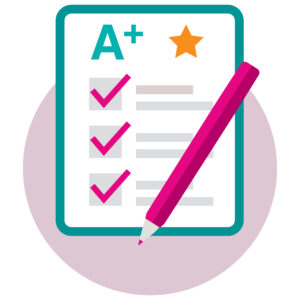
Homework and report cards
- In many schools, students do not get any homework.
- Students get report cards two or three times a year. Students in Kindergarten to Grade 9 do not get letter grades, such as A, B or C.
- Students in Grades 10 to 12 get letter grades so they can apply for college or university.
Sometimes schools and parents disagree about education. Every school has a parent group that brings people together to talk about school plans and issues. It is called a Parent Advisory Council (PAC). Any parent can get involved and attend meetings.
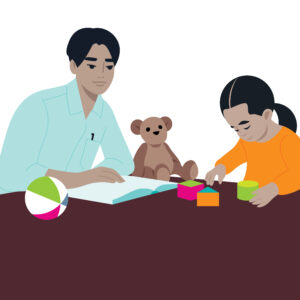
Canada also has private schools for children of all ages. Private schools, also called independent schools, cost money to attend. Some are only for girls or only for boys, or only for people of a certain religious background.
Schools teach lessons on sexuality and substance use. The goal is for young people to understand their bodies and minds, ask questions and talk freely about things that are bothering them. Some people don’t agree with talking openly about sex and drugs. Schools will tell parents when topics like these are about to be talked about. Schools focus on student safety. The goal is for everyone to feel welcome no matter what their identity. Many schools have clubs and events that support young people who are at higher risk of harm from other students. This includes youth who identify as 2SLGBTQ+ or BIPOC.
Public schools in BC are not religious unless your child is enrolled in a special religious school. Students can usually wear what they want or style their hair as they want.
Download this booklet as a PDF
- Arabic PDF | Arabic Audio Recording
- Chinese Simplified PDF | Mandarin Audio Recording
- Chinese Traditional PDF | Cantonese Audio Recording
- English PDF
- Hindi PDF | Hindi Audio Recording
- Pashtu PDF | Pashto Audio Recording
- Persian PDF | Persian Audio Recording
- Punjabi PDF | Punjabi Audio Recording
- Spanish PDF | Spanish Audio Recording
- Ukrainian PDF | Ukrainian Audio Recording
These materials were made possible thanks to a grant from the Province of BC.


